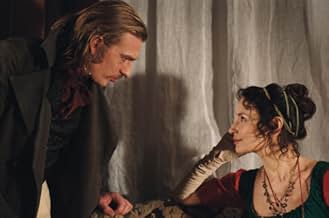Füge eine Handlung in deiner Sprache hinzuIn Majorca, in 1823, a French general, Armand de Montriveau, overhears a cloistered nun singing in a chapel; he insists on speaking to her. She is Antoinette, for five years he has searched ... Alles lesenIn Majorca, in 1823, a French general, Armand de Montriveau, overhears a cloistered nun singing in a chapel; he insists on speaking to her. She is Antoinette, for five years he has searched for her. Flash back to their meeting in Paris, he recently returned from Africa, she marri... Alles lesenIn Majorca, in 1823, a French general, Armand de Montriveau, overhears a cloistered nun singing in a chapel; he insists on speaking to her. She is Antoinette, for five years he has searched for her. Flash back to their meeting in Paris, he recently returned from Africa, she married and part of the highest society. She flirts with him, and soon he's captivated. His beh... Alles lesen
- Auszeichnungen
- 5 Nominierungen insgesamt
Empfohlene Bewertungen
Unless you're assigned to watch this for French Lit class, I would avoid it unless you're a sucker for costumes and period sets. A much better use of your time would be another recent French period piece: MOLIERE, which offers a sort of Gallic "Shakespeare in Love".
If you are looking for action, a simple plot or references to current issues, stay away from it. Actually I think it is one of the greatest strengths of the movie that Rivette leaves the story in its time and does not try to adapt it to the taste of today's audience (also a very common flaw in historic movies - and a reason why I generally hate them).
As for the story itself, I find it quite plausible and the actors get it across very credibly. However, if you are a sane person with no neurotic traits (I admit I have some) you might find it difficult to understand why the main characters torture each other that way. On the other hand, much of this is also rooted in the time in which the book was written.
And yes, it is artificial, but it is so intently and I don't see anything wrong with that...
The movie is a cinematographic translation of Balzac's "La Duchesse de Langeais", where everything, from the structure in three parts with a flashback, to the dialogs, is respected. This serious exercise is a little bit academic, but the lack of imagination is tempered by the Romanesque density of the book, which keeps the spectator's interest awake during the all movie. This fidelity to the sad and unconsumed love story sometimes brings interesting and unpredictable changes. The turning point of the movie, which tells the seduction of an intrepid General by duchess full of frivolity, has for example a very different aspect in the book and in the movie, even if it's exactly the same thing. The scene deals with Montriveau kidnapping Antoinette, as a demonstration of his will, love and power, and she'll deadly falls in love with him, as a consequence of this act. In the realistic yet dramatic world of Balzac's "Histoire des 13", this act is absolutely credible and logic, but in the soft and slow universe of Rivette, the scene almost appears unreal, as if it's only one of the Duchesse's phantasm, and you have to wait until the end to get ride of this unreality's veil.
The movie is for that reason absolutely faithful to Balzac, but also absolutely personal and definitely belongs to Rivette's personal universe. And the interest of the movie would have stayed relative, if the actors didn't bring live and movement to this static motion picture. It's indeed Jeanne Balibar and Guillaume Depardieu (most impressive in a intense and tortured Montriveau-Balzac) that creates the tension and the emotions, which would certainly have lack to this movie without them.
Wusstest du schon
- WissenswertesThe film keeps the original title of Balzac's novel from March 1834.
- PatzerWhen Armand is reading the final letter of the Duchess, a wall socket is visible.
- VerbindungenReferences Die schöne Querulantin (1991)
- SoundtracksFleuve du Tage
Poésie J. H. Demeun; musique B. Pollet
Performed by Julien Bezias, Marie-Judith de Bucy, Jean-Yves Gratius, Gildas Guillon, Rosalie Hartog, Eric Lebrun, Marie-Ange Leurent, Christophe Minck, Sophie Rochon and Romain Senac
Top-Auswahl
Details
- Erscheinungsdatum
- Herkunftsländer
- Offizieller Standort
- Sprachen
- Auch bekannt als
- The Duchess of Langeais
- Drehorte
- Tremiti Islands, Foggia, Apulia, Italien(island and convent)
- Produktionsfirmen
- Weitere beteiligte Unternehmen bei IMDbPro anzeigen
Box Office
- Bruttoertrag in den USA und Kanada
- 282.749 $
- Eröffnungswochenende in den USA und in Kanada
- 22.251 $
- 24. Feb. 2008
- Weltweiter Bruttoertrag
- 982.795 $
Zu dieser Seite beitragen






























